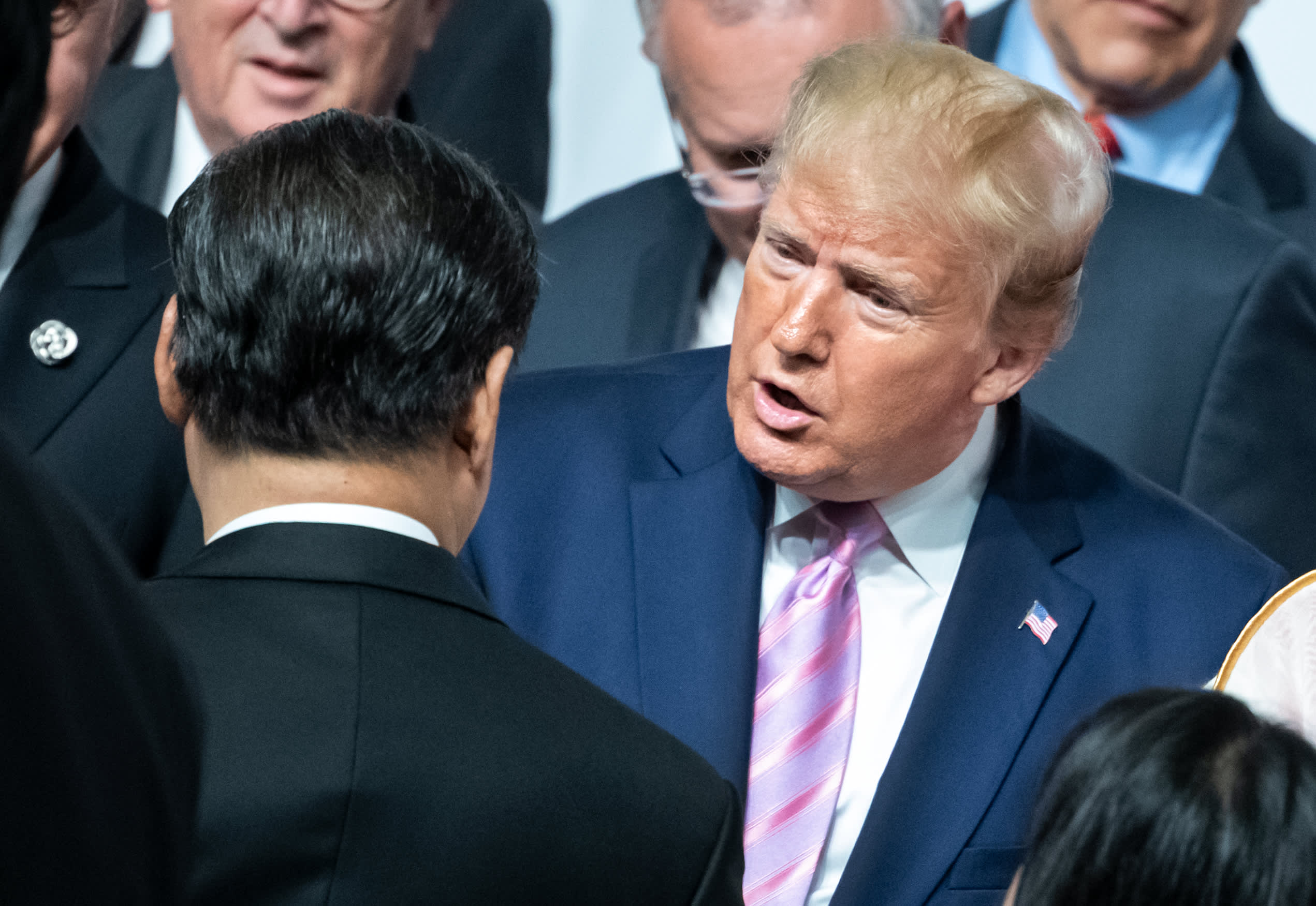
Chinese President Xi Jinping and U.S. President Donald Trump chat at a G-20 event a day before their highly anticipated bilateral meeting.
Bernd von Jutrczenka | picture alliance | Getty Images
U.S. President Donald Trump and Chinese President Xi Jinping agreed on Saturday to proceed with negotiations after a series of escalations to their nations' trade war threatened to disrupt the global economy.
On the sidelines of the G-20 summit in Osaka, Japan, the two leaders held a highly anticipated meeting, which Chinese media outlets reported ultimately took about 80 minutes.
Speaking after the bilateral, Trump said it had gone as well as it could have, and that negotiations with China would continue.
"We are back on track," the president said.
The Chinese state media, meanwhile, reported the two sides had agreed to restart talks and that the U.S. did not plan to levy any new tariffs on Chinese goods at this time.
The result of the presidents' talks appeared to align with what many experts predicted ahead of the event. That is, analysts and former diplomats who spoke with CNBC projected that there would be an agreement to temporarily pause any trade war escalation.
Still, markets were on edge about the meeting because Trump himself had suggested that he would be deciding whether to hit China with more punitive trade taxes if he didn't like what he heard from Xi. On the other hand, there had been sporadic hopes that Saturday's meeting could have resulted in the announcement of a framework for some sort of long-term deal.
Leading up to the meeting
At the outset of the high-stakes talks, Trump said he was open to a trade deal that would be "monumental."
"I actually think that we were very close and then something happened where it slipped a little bit and now we're getting a little bit closer," Trump said on the sidelines of the Group of 20 (G-20) meeting in Osaka, western Japan.
"But it would be historic if we could do a fair trade deal. We're totally open to it and you're totally open to it," he said.
"I think this will be a very productive meeting and I think we can go on to do something that truly will be monumental," he added.
Xi, meanwhile, said at the beginning of the meeting that he was ready to exchange views on fundamental issues.
"Forty years on, enormous change has taken place in the international situation and China-U.S. relations, but one basic fact remains unchanged: China and the United States both benefit from cooperation and lose in confrontation," Xi said.
"Today I'm prepared to exchange views with you on the fundamental issues concerning the growth of China-U.S. relations," the Chinese leader added.
The commentary ahead of the meeting from Chinese state media suggested the two countries would not have an easy time reaching an agreement. China's Communist Party-run Global Times said earlier on Saturday the world had to "contain capricious U.S. actions," pointing to examples like Trump withdrawing from the Paris climate accord.
"The world needs to rein in the U.S., although it's difficult," the paper said in an editorial. "The problem is that many countries have misgivings in expressing their opposition to U.S. bullying tactics out of fear for U.S. power, or hope to profit from the U.S. stirring up the global order through opportunism."
What was at stake
The Trump-Xi meeting had been deemed a globally significant event because the ongoing trade war has threatened to disrupt many countries' economies and has roiled businesses' international supply lines.
OECD Secretary-General Jose Angel Gurria told CNBC on Friday that, if talks between Trump and Xi fell through, that would "be very, very destructive."
A fallout, he added, "would spill over to practically every single economy in the world ... because (the U.S. and China) have this massive relationship with the rest of the world, you would have this inevitable impact, very negative impact."
The International Monetary Fund warned in June that the implemented and proposed tariffs between the two countries could potentially cut global economic output by 0.5% in 2020.
–Reuters, CNBC's Grace Shao and CNBC's Evelyn Cheng contributed to this report.
No comments:
Post a Comment